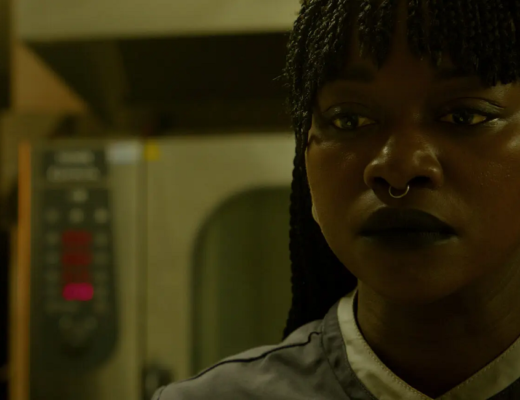Taking inspiration from the Mary Kay Letourneau-Vili Fualaau scandal that roiled the tabloids for much of the ’90s, Todd Haynes’ May December is, at its most basic level, lending a human face to infamy. With the real-life figures rechristened here as Gracie and Joe, the film dims the harsh glare of the spotlight, presenting its players as having settled into an almost mundane existence of barbecues and semi-anonymously running errands around town. Passions have been dampened by time, the public has mostly moved on (save the occasional box of excrement mailed to them), and the familiarity of domesticity has lent the couple a sense of almost boring normalcy. But this is Todd Haynes, one of the preeminent semioticians and arch-stylists of modern film; an artist whose work all but demands to be viewed as a snake eating its own tail. May December is told from the perspective of a Hollywood actress, cast to play Gracie in a filmed dramatization, with the character invited into this private world to research her subjects up close. True to form, it allows Haynes to excavate the nature of inhabiting vs. imitating a person, the intersection of notoriety and celebrity, and the futile nature of attempting to observe something without influencing it. That the film provides considerable thematic gristle to chew on shouldn’t come as a shock to fans of the filmmaker. That May December is also willing to embrace the luridness of the subject matter and even a playful campiness might not surprise many either, but it does enliven the proceedings.
For those unfamiliar with the Letourneau affair, the case revolved around a 30-something female school teacher having a sexual relationship with a twelve-year-old male student. Despite intense media scrutiny, restraining orders, and multiple stints in prison, Letourneau and Fualaau continued to surreptitiously see one another, with Fualaau fathering multiple children with her before turning 18. The couple eventually married in the mid-00s and remained together until 2019, with Letourneau passing away of natural causes a year later. Perhaps looking to avoid the sad fate that befell the real world counterparts, May December is set in 2015 with Gracie (Haynes’ longtime leading lady, Julianne Moore) and Joe (Riverdale actor, Charles Melton) still living together just outside of Savannah and on the cusp of sending their two youngest off to college. Joe is now the same age that Gracie was when they first started seeing one another, although to watch them interact one with another one might still mistake them for mother and son: she monitors his alcohol intake, is constantly badgering him about cleaning up the bugs he’s raising around the house, and gets onto him for failing to shower before coming to bed. Is it any wonder he’s been secretly texting someone and floating the idea of running off to Mexico with them? Into this hothouse enters Elizabeth (Natalie Portman), a TV star disdainful of the junky TV show that’s made her famous. Waltzing into Gracie and Joe’s life with an air of mystery and glamour, Elizabeth hopes to understand their lives from the inside out in order to truly get inside her character. It starts with taking notes from a polite distance, but over time her dedication to the role becomes more participatory.
Elizabeth soon becomes a regular presence in the couple’s lives: tagging along with Gracie as she tends to her social calendar, visiting Joe at work where she’s all but constitutionally incapable of not flirting with him, and sitting in on increasingly strained family dinners — for the teens in the household, the novelty of having an actress in their presence is fleeting. All the while, Gracie and Joe ply Elizabeth with intimate details and mementos from their illicit courtship — changed by May December from a student-teacher relationship to an afterschool job, with the consummation taking place in the stockroom of a pet store — while attempting in vain to keep the details of their present-day lives off-limits. Both Gracie and Joe recognize the disruptive presence an outsider dredging up the past will have in their lives, yet they find themselves helpless in the face of trying to affect the shape of their own narrative. And all the while, Elizabeth permeates their private lives, blurring the line between research for a part and assuming parts of Gracie’s identity that go far beyond borrowing her makeup regimen and emulating her speech impediment.
There’s a remarkable sequence about 30 minutes into the film where Gracie and Elizabeth sit in a boutique and observe Gracie’s youngest daughter as she tries on dresses for her high school graduation. Shot in an unbroken static take, Moore and Portman are positioned in front of a tri-fold full-length mirror (Haynes returns to the mirror motif throughout the film) which allows the two women to look at one another while staring straight ahead — but due to a trick of the reflection, Gracie also appears as if she’s flanking Elizabeth on both sides. As Gracie’s daughter poses in front of them in different outfits, Elizabeth begins to “unconsciously” imitate Gracie’s every physical movement; the way she crosses her arms or how she moves the hair out of her face. Yet of far greater interest is the backhanded compliment Gracie pays her daughter — a crack about her being brave enough to show her exposed arms and not caring about “unrealistic beauty standards”. It silently crushes the younger woman, causing her to diplomatically select a different, more conservative dress, tacitly appeasing mom in the process. It’s instructive of what the film is trying for: painting Portman’s character, for all her method aspirations, as someone in possession of a skin-deep understanding of her subjects while failing to recognize something fundamental about their nature. For all her overtures to trying to comprehend Gracie and Joe’s relationship, Elizabeth is drawn to salaciousness, easy answers, and obvious signifiers — she all but lights up hearing a rumor that Gracie was sexually abused herself as an adolescent — while true understanding remains just outside her grasp. Portman’s oversexed starlet tours the infamous stockroom, lying on the hard ground, privately pantomiming ecstasy as though she were cradling an imagined tween; in a double-entendre, she’s instructed by the store owner “just don’t touch any of the bait.” This sequence is accompanied with music that dramatically swells, and never has the disconnect between the character’s stated intentions and her tawdry inclinations felt clearer.
It’s a knowingly trashy moment, but it speaks to Haynes’ overarching approach to the material. If the film, as described, sounds heavy, it’s really not. With its soft diffuse lighting, melodramatic flourishes, and simmering sexual tension, May December superficially resembles the sort of cheapo made-for-TV movies that used to be dashed off in the immediate aftermath of scandals like this to capitalize on their public visibility (in another winking acknowledgment, we see Elizabeth watching one for research). The film views celebrity as a dual-edge sword with the insatiable desire to consume icky details about Gracie and Joe by first the public and then Elizabeth matched by the way Elizabeth is herself objectified and weaponizes her own sexuality. At one point, a family friend confides that he Googled the actress’ nude scenes; elsewhere, Joe watches her commercials for face wash on a loop and Elizabeth herself holds court in a squirm-inducing scene set in a high school acting class where she responds to a snarky question about filming love scenes with a monumentally awkward monologue for the benefit of the assembled teenagers. She talks about rubbing up against a scene partner wearing “practically nothing” and losing the distinction between experiencing real pleasure and pretending not to out of professional self-preservation — even when the film is being smutty, it feels like the layers of an onion being peeled away. And through it all, Haynes incorporates Michel Legrand’s theme from 1971’s The Go-Between as a florid stinger on the soundtrack, punctuating dialogue as outwardly banal as “I don’t think we have enough hot dogs” with ominous pounding on the piano; it all plays like something between a soap opera and the ancient Internet meme, “dramatic chipmunk.”
Haynes is a filmmaker at times prone to chilliness and self-seriousness, but the tone is more relaxed, almost jocular, here. May December identifies the complicated humanity in the notorious, giving voice to those genuinely harmed by Gracie’s actions — specifically, her adult son, who is also the same age as Joe and is still hanging on to an enormous amount of baggage about the whole thing — while being a little rueful about the entire idea of digging up the past for content… which very well may extend to the film itself. Further, it recognizes that, while Joe may have been a willing participant in his own seduction — Gracie still claims that he was the aggressor — he was undeniably a child and that, in many ways, he remains emotionally stunted by his experiences. And for that matter, he’s still being exploited by a more worldly woman in the form of Elizabeth, who is all too aware of the effect she has on him. Yet the film resists placing these characters into simple boxes or haranguing the viewer, arriving at a more nuanced understanding of Gracie and Joe’s attributes and flaws than Elizabeth could ever hope to achieve. Elizabeth may only be able to see her subject as a wounded temptress because it’s the role she herself understands, but life is rarely that simple. As Moore defiantly tells Portman in their parting scene together: “I’m secure. Make sure they put that in there.”
DIRECTOR: Todd Haynes; CAST: Natalie Portman, Julianne Moore, Charles Melton, Cory Michael Smith; DISTRIBUTOR: Netflix; IN THEATERS: November 17; STREAMING: December 1; RUNTIME: 1 hr. 53 min.







